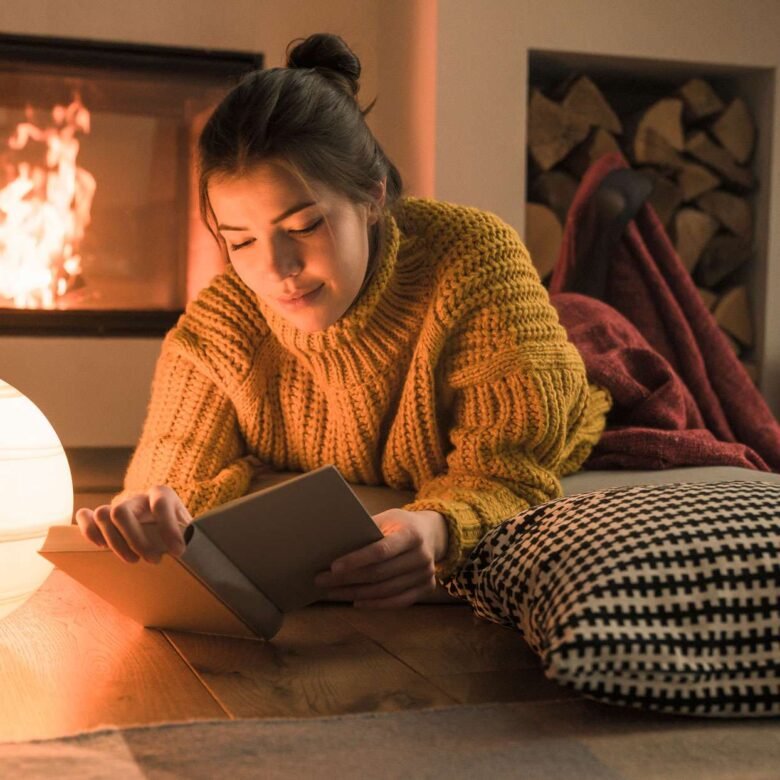In today’s fast-paced world, a relaxing evening routine is an essential component of maintaining mental well-being and ensuring a restful night’s sleep. The actions you take in the hours leading up to bedtime can either enhance or hinder your sleep quality, and they can directly influence how you feel the next day.
A consistent and calming evening routine not only helps to signal your body that it’s time to unwind but also reduces stress, alleviates anxiety, and prepares your mind and body for restful, rejuvenating sleep. This comprehensive guide will walk you through the best practices for creating an evening routine that improves sleep quality and promotes relaxation.
Why a Relaxing Evening Routine Matters
Your evening routine is a chance to “close” your day in a peaceful and intentional manner. What you do before bed can have a significant impact on your overall health, sleep quality, and stress levels. Here are some of the benefits of a relaxing evening routine:
- Improved Sleep Quality: Establishing a calming pre-sleep routine helps regulate your body’s natural circadian rhythms, making it easier to fall asleep and stay asleep.
- Reduced Stress and Anxiety: A soothing evening ritual helps activate the body’s parasympathetic nervous system, lowering cortisol (the stress hormone) and promoting relaxation.
- Better Mental Health: Having a clear boundary between your workday and personal life can reduce anxiety and mental clutter.
- Physical Health: Reducing stress through relaxation techniques lowers blood pressure, strengthens the immune system, and improves overall health.
By prioritizing a routine that includes relaxation, reflection, and self-care, you’ll wake up feeling more rested and ready to tackle the day ahead.
Key Components of a Relaxing Evening Routine
A well-designed evening routine for sleep and stress reduction should incorporate several key elements:
- Create a Consistent Bedtime
- Wind Down with Relaxing Activities
- Limit Screen Time and Digital Exposure
- Practice Mindfulness or Meditation
- Engage in Gentle Physical Activity
- Set Up a Comfortable Sleep Environment
- Practice Gratitude and Reflection
- Avoid Caffeine and Heavy Meals Before Bed
Let’s explore each of these components in greater detail.
1. Create a Consistent Bedtime
One of the most important factors for a good night’s sleep is consistency. Going to bed at the same time each night helps regulate your internal body clock (circadian rhythm), making it easier to fall asleep and wake up at the right times.
Why It’s Important:
- Regulates Sleep Cycles: A consistent bedtime allows your body to anticipate when it’s time to sleep, improving sleep quality.
- Strengthens Circadian Rhythm: By going to bed and waking up at the same time, you reinforce your body’s natural rhythm, leading to better sleep.
- Improves Sleep Quality: Regular sleep patterns are associated with better restorative sleep, which helps in physical and mental recovery.
How to Start:
- Choose a bedtime that allows for 7–9 hours of sleep (depending on your age and needs).
- Set an alarm for your evening routine’s start time, signaling when to wind down for bed.
- Gradually shift your bedtime if it’s currently inconsistent, aiming to go to sleep 15 minutes earlier each night until you reach your ideal bedtime.
2. Wind Down with Relaxing Activities
As you move closer to your bedtime, it’s essential to slow down both physically and mentally. Engaging in relaxing activities can help signal to your body that it’s time to wind down.
Why It’s Important:
- Shifts from Active to Restorative Mode: Calm activities activate the parasympathetic nervous system, which promotes relaxation and prepares your body for sleep.
- Reduces Mental Clutter: Gentle activities help clear your mind of the day’s stresses, making it easier to sleep.
- Calms the Body: Relaxing activities help lower heart rate, breathing, and muscle tension.
How to Start:
- Read a Book: Choose a physical book or an e-reader with no blue light to avoid stimulating your mind.
- Take a Warm Bath or Shower: The temperature change between a warm bath and cool bedroom signals to the body that it’s time to sleep.
- Practice Gentle Stretching or Yoga: Focus on deep, restorative poses like child’s pose or forward bends to relax your muscles.
3. Limit Screen Time and Digital Exposure
The blue light emitted by phones, computers, and televisions can interfere with the production of melatonin, the hormone that regulates sleep. Exposure to screens before bed can delay sleep onset and reduce sleep quality.
Why It’s Important:
- Blue Light Disrupts Melatonin: Blue light suppresses melatonin production, making it harder to fall asleep.
- Prevents Mental Overload: Checking emails, social media, or news updates can elevate stress levels and keep your mind active when you should be winding down.
How to Start:
- Avoid screens (phone, computer, television) for at least 30–60 minutes before bed.
- Use blue light blockers (apps or glasses) if you absolutely need to use screens at night.
- Engage in offline activities like journaling, reading, or listening to soothing music instead.
4. Practice Mindfulness or Meditation
Mindfulness and meditation are powerful tools for reducing stress and preparing your body for restful sleep. These techniques help calm your mind, regulate your emotions, and foster a sense of inner peace.
Why It’s Important:
- Calms the Mind: Meditation helps release mental tension and emotional stress.
- Promotes Relaxation: Mindfulness and meditation trigger the body’s relaxation response, lowering heart rate and reducing cortisol.
- Improves Sleep Quality: Regular meditation practice is linked to better sleep quality, reduced insomnia, and fewer nighttime awakenings.
How to Start:
- Guided Meditation: Use apps like Headspace, Calm, or Insight Timer to guide you through relaxation techniques before bed.
- Breathing Exercises: Focus on deep breathing techniques such as diaphragmatic breathing or 4-7-8 breathing to calm your nervous system.
- Body Scan Meditation: Gently scan through your body, starting from your toes and moving upward, paying attention to areas of tension and consciously releasing them.
5. Engage in Gentle Physical Activity
While intense exercise is better suited for the daytime, gentle physical activities in the evening can relax your body and mind, easing any physical tension that has built up throughout the day.
Why It’s Important:
- Relieves Muscle Tension: Light stretching or yoga can alleviate physical tension, making it easier to sleep.
- Improves Relaxation: Physical activity promotes the release of endorphins, which enhance feelings of relaxation and well-being.
- Prepares the Body for Sleep: A calm, relaxed body is more likely to fall into a deep, restful sleep.
How to Start:
- Gentle Yoga: Focus on poses that open the hips, lengthen the spine, and release neck and shoulder tension.
- Stretching: Perform basic stretches, holding each pose for 20–30 seconds.
- Tai Chi: Slow, flowing movements can help calm the mind and prepare the body for rest.
6. Set Up a Comfortable Sleep Environment
Your bedroom environment plays a crucial role in the quality of your sleep. Ensuring that your sleep space is comfortable, quiet, and conducive to rest is key to creating an ideal sleep atmosphere.
Why It’s Important:
- Improves Sleep Quality: A cool, dark, quiet environment improves sleep by preventing disruptions.
- Promotes Comfort: A comfortable bed and pillows help reduce physical discomfort during sleep.
- Prevents Stressors: A calm, tidy bedroom promotes relaxation and reduces stress.
How to Start:
- Adjust Room Temperature: Keep the bedroom cool (around 60-67°F or 16-19°C) for optimal sleep.
- Limit Light Exposure: Use blackout curtains or wear an eye mask to block out light.
- Create a Calming Ambiance: Consider using a white noise machine, lavender-scented candles, or aromatherapy (such as lavender or chamomile essential oils) to set a relaxing tone.
7. Practice Gratitude and Reflection
Taking a moment to reflect on your day and express gratitude can help shift your focus away from stressors and toward positive thoughts, preparing your mind for restful sleep.
Why It’s Important:
- Reduces Anxiety: Practicing gratitude reduces negative thinking patterns, which can contribute to anxiety and insomnia.
- Fosters Positive Thinking: Reflecting on your day helps to focus on the positive, creating a sense of fulfillment and peace before bed.
- Helps You Sleep Better: Reflecting on the positives of your day can improve overall sleep satisfaction.
How to Start:
- Gratitude Journal: Write down 3 things you are grateful for that day.
- Reflect on Your Day: Take a few moments to mentally review your day, focusing on what went well.
- Positive Affirmations: End your night by repeating calming affirmations such as “I am calm and relaxed,” or “I am grateful for today.”
8. Avoid Caffeine and Heavy Meals Before Bed
Consuming caffeine, nicotine, or heavy meals late in the evening can interfere with
your sleep and cause discomfort during the night.
Why It’s Important:
- Caffeine Disrupts Sleep: Caffeine stays in your system for several hours, affecting your ability to fall asleep.
- Heavy Meals Cause Discomfort: Eating large or spicy meals close to bedtime can lead to indigestion, heartburn, or discomfort, hindering your sleep.
How to Start:
- Avoid caffeine (coffee, tea, chocolate, soda) in the afternoon and evening.
- Have a Light Dinner: Opt for light, easily digestible meals, and avoid heavy, rich foods before bedtime.
- If you need a snack, choose something calming and soothing like a small bowl of oatmeal or a banana.
Conclusion: Crafting Your Relaxing Evening Routine
Creating a relaxing evening routine is an effective way to improve sleep, reduce stress, and enhance your overall well-being. By following the steps outlined in this guide—such as creating a consistent bedtime, winding down with relaxing activities, limiting screen time, and setting up a peaceful environment—you can set yourself up for a restful night of sleep.
Remember that consistency is key. Begin with small changes and gradually build your routine to suit your personal needs and preferences. With time, you’ll notice significant improvements in your sleep quality, stress levels, and overall health. Sweet dreams!




